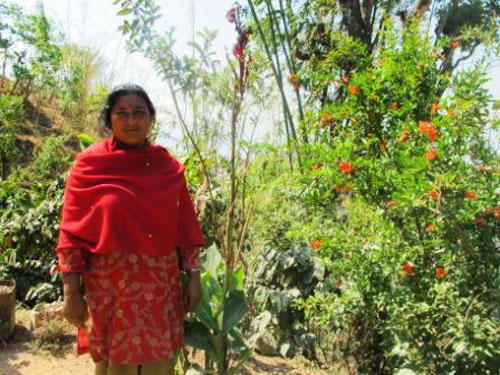Evolution of gender relations among Nepalese farmers

CGIAR research program and LI-BIRD researchers travelled to Nepal's Gulmi District to put the 'Home Gardens' initiative's results under a gender lens.
By Marlène Elias and Miranda Morgan
CGIAR research program and LI-BIRD researchers travelled to Nepal's Gulmi District to put the 'Home Gardens' initiative's results under a gender lens.
Home gardens play a big role when it comes to improving dietary diversity, bringing in extra income, and improving family well-being through the use and conservation of biodiversity. Yet these productive gardens are often overlooked by mainstream policy and agricultural development priorities when assessing the nutritional diversity and livelihood options of poor rural communities. Bioversity International and partners' 'Home Gardens' initiative in Nepal set to turn this around.
Looking back at this initiative started in 2002, an external evaluation highlighted several successes. Not only the local biodiversity but also peoples' nutrition and incomes had been enhanced through the consumption and sale of home garden produce.
Putting results under a gender lens
A few months ago, nine years since the end of the initiative, researchers returned to conduct a follow-up study that would help understand exactly how, and due to which specific interventions and facilitating factors, the initiative was able to foster greater equality between women and men of different age and socio-cultural backgrounds, and how this affected the management of plant biodiversity.
This study showed that the 'Home Gardens' initiative has encouraged social inclusion and created a power shift. The initiative created a forum within which men and women of upper and lower castes could interact on a progressively more equal footing. Women and men farmers from different ages and castes were brought together to learn and share ideas in ways that were generally not acceptable in the larger society. These interactions have increased mutual acceptance and respect. The activities of the initiative have additionally helped farmers from the Dalit caste (considered a lower caste) reduce their dependency on upper caste households for acquiring nutritious fruits and vegetables; and this too is changing local power relations.
Earning small amounts of income for the first time has also increased women's social position relative to others in their household or community. As a Dalit woman explained, "When I didn’t have any income, I had to ask for everything from my husband […]. I didn’t have any freedom." Now that she has an income, she and her husband consult each other about their activities and finances. These gains have compounded other recent major drivers of change in gender norms, such as the formal education of girls, to bring notable changes in gender relations in the community.
Among the interventions, participants particularly appreciated the exposure visits and training, which expanded their understanding and vision of the world. When asked by fellow villagers: "What did those [researchers] people give you", one female participant replied: "They provided me with skills." And once acquired, those skills cannot be taken away; they are not changed by the climate or affected by the vagaries of the market.
Colleagues from LI-BIRD were instrumental in motivating participants and helping women speak in public, enabling them to participate as their community’s representatives in the project.
Women's sense of empowerment was also fostered by their ability to drive changes in their own environment. One Dalit woman explained that: "Earlier the soil was not good, and our lands were barren; I brought these trees and plants here one by one, and now all is green". These experiences improved the confidence and capacity of women and Dalit participants and their status within their community.
Changing trends in Nepal
The success of the 'Home Gardens' initiative was also bolstered by wider developments that were simultaneously revolutionizing the community’s socio-economic and ecological conditions. Over the past 15 years, Gulmi's villages have become better connected with a paved road. This allowed for the provision of electricity, water, machinery and telecommunications to the villages, as well as improved marketing and educational opportunities. Women's drudgery was thus reduced and countless hours of their time was freed up; this is time they are now able to invest in their home gardens. Access to water has allowed some participants to irrigate their garden and the road has facilitated trade. Other projects and initiatives also complemented the 'Home Gardens' initiative by strengthening farmers' collective actions and access to credit; two critical factors enabling them to improve their well-being.
As new trends, such as the formal schooling of girls and boys and feminization of agriculture become more prevalent, we think that working with schools and developing innovative approaches to interest the youth in home gardening, biodiversity conservation and healthy eating should be encouraged. Gains in literacy and the spread of telecommunications technologies are also opening up new possibilities for disseminating information and innovations. With continued gains made towards gender equality and social inclusion, such innovations can pave the way for a more food secure, sustainable and equitable future.
Read more about the 'Home Gardens' initiative.
The first phase of the 'Home Gardens' initiative was conducted by Bioversity International, LI-BIRD and the Swiss Agency for Development and Cooperation between 2002 and 2005. In April 2014, researchers from Bioversity International’s CGIAR Research Programme on Forests, Trees and Agroforestry, WorldFish researchers from CGIAR Research Programme on Aquatic Agricultural Systems and scientists from Nepalese NGO Local Initiatives for Biodiversity Research and Development (LI-BIRD) headed to the field in Nepal’s Gulmi District to examine the processes of change in gender relations that can result from biodiversity research for development projects.
Photo: Parbati, Nepalese farmer, in her home garden. Credit: Bioversity International/M.Elias
